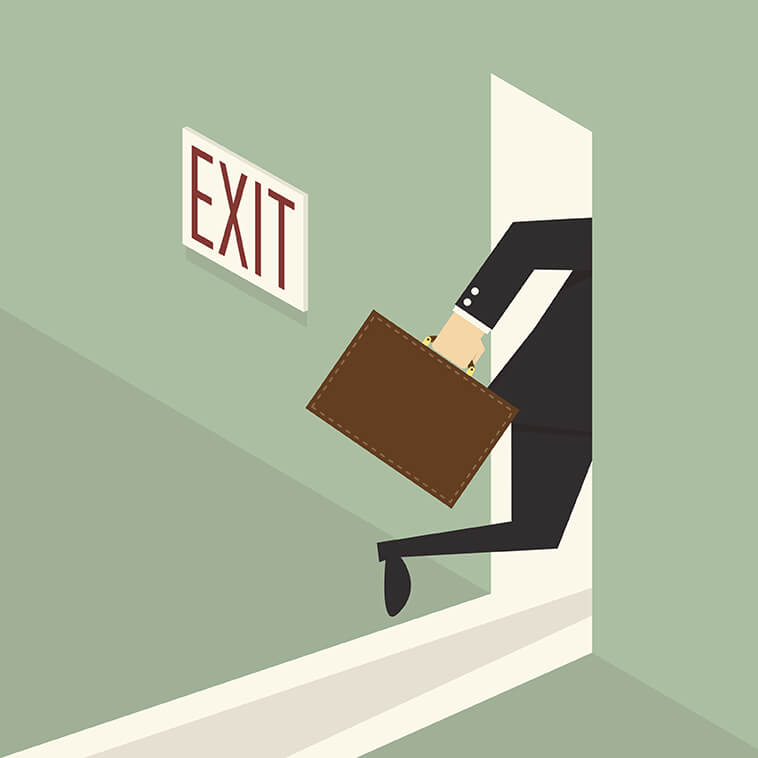If going into the office every day leaves you less than thrilled, you’re not alone. In fact, Gallup’s 2013 State of the American Workplace study found that 70 percent of those polled described themselves as disengaged at work. It seems fitting that a record number of workers are taking the plunge from cubicle dweller to full-time consultant. The truth is that more and more working-aged people – particularly millenials – are trading corporate 9-to-5 jobs for the freelance life. Just how many? According to the Freelancers Union, one in three Americans currently works as a freelancer. Read on for the telltale signs that it might be time to say so long to your 9-to-5 gig.
Going to work feels like a chore
If you hate your job, it might be the universe telling you that you’re not cut out for your current position. After spending years as a classroom teacher who freelanced on the side, I eventually got to the point where I felt more personally fulfilled and excited by my side gigs. In other words, I was kind of starting to hate going to work. I took this as a sign that it was time to bow out of the school system and start doing what I loved. Many freelancers are nudged into self-employment in much the same way. “I wasn’t satisfied with my content job at an Internet company, and I felt like my work was holding me back from accomplishing my main personal goal – to become a professional, full-time writer,” said Stefan A. Slater, a 26-year-old freelance writer who stepped out of corporate life in 2012. Leaving the security of a full-time job can be scary, but you have to ask yourself: Am I doing the job I always dreamed of doing?
You daydream about making your own work schedule
On Friday morning, I’ll get up at 6:00 a.m. and work on projects for a few hours before heading over to my daughter’s preschool for a Thanksgiving feast. I didn’t have to request time off to do this – I simply built my workflow around it. Having the freedom to create your own work schedule is perhaps the greatest advantage of freelancing. “At my last job, I felt a lot of pressure to be in the office, even though I could do my work from the bottom of the sea if necessary,” said Vanessa McGrady, who just left a full-time office job for the freelance life. She currently writes a personal finance column for Forbes.com. McGrady says that she treasures her flexible time, which allows her to go to yoga in the middle of the day and spend more time visiting family and friends.
“It’s scary, not having that magical paycheck, but I think that just makes me work harder,” said McGrady.
Your job isn’t safe
Those of us with serious job security may find the prospect of self-employment a bit scary. For Dan Spalding, a PR consultant who left his 9-to-5 as a corporate communications director in 2009, rumors of impending layoffs were what pushed him to go his own way. “I wasn’t going to be affected, but I knew some of my friends were,” said Spalding, founder of Spalding Communications. “I wasn’t exactly ready to step out into my consulting business, but I knew it would not be fair for the company to lay people off and keep me on, only to tell them in a few months that I was leaving to build my consultancy.” By stepping out when he did, Spalding ended up saving another employee’s job. The act of decency paid off – Spalding’s former employer signed on as one of his first clients.
You’re looking for a challenge
Some of us rest easy in the predictable demands of our 9-to-5 jobs. For others, the monotony can be a killer. Going your own way as a freelancer comes with its own unique set of challenges sure to keep you on your toes. For starters, building a solid client list is a job in itself. If you’re contemplating quitting your job to work for yourself, McGrady suggests lining up your prospects beforehand. For her, this took the form of scouring her LinkedIn network and reaching out to contacts she’d worked with in the past. (This simple act secured her two new clients that same day.) Clientele aside, freelancers have other responsibilities to manage. Saving for retirement, paying quarterly taxes, and keeping your projects straight are all part of your day-to-day. No matter what your business is, the consulting route can sometimes feel unpredictable. But knowing that this is your livelihood definitely revs up the motivation in a way that no other job does. You’re paying a boatload for childcare
If you feel like your entire paycheck goes to daycare and babysitters, it might be time to reevaluate how much your 9-to-5 is costing you. Plus, even if you love your job, being a working parent can be tough. Working from home for a few years comes with some perks. In addition to saving you tons on childcare costs, it also allows you to take a more active role in caring for your little one. And unlike stepping out of the workforce permanently, freelancing for a couple years keeps you relevant in your field. Even if it’s just part-time gigs here and there, working from home during your child’s early years eliminates the eyesore of having a gap on your resume. If you do decide to go back to the corporate world, you’ll also have recent contacts from the time you spent working for yourself.
5 signs it’s time to leave your 9-to-5

THINKSTOCK


















